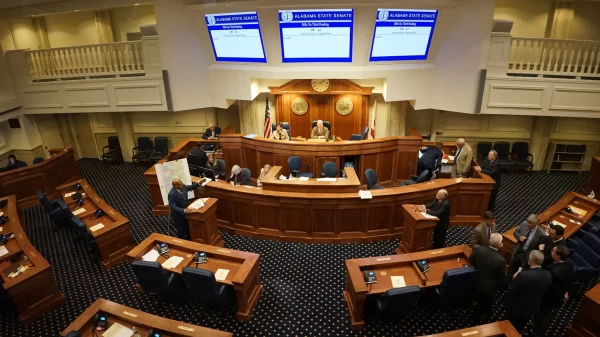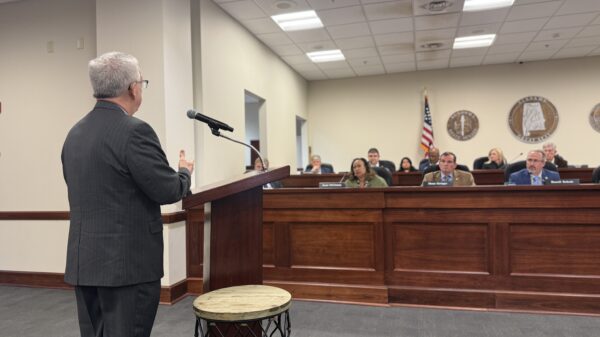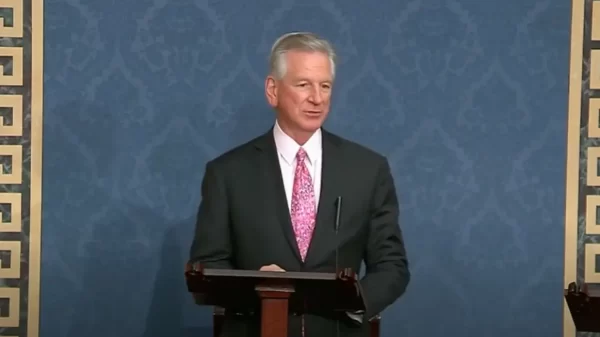In Alabama, politics never sleeps. Day after day, year after year, the Alabama political machine is churning, and it often produces some of the most compelling, interesting, depressing and triumphant stories in America.
2023 was no exception to that rule. APR covered some of the most important and consequential stories in the country, and mostly did so simply because we cover politics in this state. From an all-important fight for voting rights and equality to the facts surrounding the death of a beloved small-town mayor, the stories spanned the gamut of emotion and importance. Here are our Top 5, and a little bonus at the end.
The Death of Bubba Copeland
Sadly, there is likely no story that better encapsulates the pathetic state of politics in Alabama (and in many red states) better than the terrible story of Smiths Station Mayor Bubba Copeland’s death. Outed by the conservative website 1819 News for privately posting cross-dressing photos of himself, Copeland endured two days of shaming before ultimately dying by suicide.
In the aftermath, a number of people who have spent the last few years using LGBTQ+ people as scare tactics suddenly realized that their shaming and name calling had real victims. 1819 endured a backlash rarely seen for a conservative website, losing public support and reportedly losing private financial backing.
The town of Smiths Station, however, lost forever a good mayor and a better person, according to those who knew Copeland. Investigations into vague allegations leveled against Copeland in the aftermath of his death turned up nothing. Instead, the state – and people around the country who followed the story – were left to consider that vilifying people for simply being who they are – and not hurting a soul – has real, terrible consequences.
Lawmakers Arrested
Recapping the arrests of Alabama state leaders seems to be an annual entry in this list. This year, oddly, the indictments, which have been dominated of late by Republicans, hit both parties. Reps. David Cole, R-Madison, along with Fred Plump, D-Birmingham, and John Rogers, D-Birmingham, were all indicted, albeit for vastly different crimes.
Cole was arrested and ended up pleading guilty to charges of election fraud. Those charges stemmed from Cole’s scheme to get elected in House District 10, despite not actually living in that district. To circumvent the residency requirement, Cole used the address of a family friend. He compounded that crime by registering to vote using the friend’s address and then knowingly voting in the wrong precinct. All of those things are felonies. Cole ended up serving a few days in the Madison County jail and he was forced to repay thousands of dollars to the state.
Plump also has pleaded guilty after federal prosecutors charged him in a scheme to skim money from a community service fund that was meant to benefit local charities, sports teams and other community-centric endeavors. Longtime state Rep. John Rogers, in the meantime, appears to have no intentions of pleading guilty after he was charged with obstruction of justice in the same investigation that ensnared Plump.
Rogers, a colorful and boisterous character known for outlandish comments and a fearless approach to the job of state representative, has maintained that he’s done nothing wrong and that federal prosecutors are only charging him with obstruction because they’re mad that they can’t find evidence that he did anything illegal. In the days following his arrest, Rogers was ordered jailed because he violated bond by calling a witness (on accident, Rogers claims). Rogers also disclosed the witness’s name during a call to a talk radio show.
Tuberville’s Blockade
Even in today’s political world, where personal grandstanding and unabashed pandering are the norm, Sen. Tommy Tuberville’s 10-month blockade of military promotions was a spectacle of some rarity. Not because it placed the personal political beliefs of a single U.S. senator above the readiness of the United States military, but because it managed to do the one thing few issues can do anymore – bring Democrats and Republicans together in their mutual hatred of it.
Tuberville’s blocking of promotions was centered on a flawed premise from the start – that the Biden administration and the Department of Defense was injecting personal political beliefs into the military. Tuberville stated repeatedly that a new DOD policy was using taxpayer funds to pay for abortion services. In fact, the DOD policy was doing the opposite of playing partisan politics – it was establishing that the U.S. military was neutral on the issue. It did so through a policy that reimbursed active duty military personnel for their travel if they were forced to go to another state to receive healthcare services, including abortions, that were not available, or were illegal, in the state in which they were stationed.
Such a policy doesn’t endorse abortions. It all doesn’t take a stand against abortion by burdening personnel with long-distance travel to receive those services. Instead, it simply says that the policy of the U.S. military is to make all services legal in other U.S. states available equally to all personnel.
Because Tuberville either couldn’t grasp this concept, or, more likely, because he liked the attention he was getting, he refused to back down on his blockade. By November, he had held up more than 400 promotions and thrown the military community into chaos, as retirements were put on hold, positions went unfilled and important assignments were neglected. Top military brass warned that the blockade was seriously affecting military readiness and hindering the U.S.’s ability to lead around the globe. And then, Tuberville’s fellow Republicans started to pile on. In a stunning show of rebuke, several of Tuberville’s colleagues took to the Senator floor to blast Tuberville and highlight the damage he was doing.
In the end, Alabama’s senior senator gave up the blockade – calling it a “draw” – without receiving a single concession from the Biden administration or DOD. He simply upended military lives for nearly a full year for nothing.
Medical Cannabis Catastrophe
When the Alabama Legislature passed a bill two years ago allowing medical marijuana in the state, few people envisioned a process that would take more than a year before the Alabama Medical Cannabis Commission would even begin accepting applications. And even fewer could have predicted the chaos that would envelop that licensing process.
Over the past year, the AMCC has awarded licenses on three occasions, and on three occasions it has been subjected to an onslaught of lawsuits and court actions that resulted in the Commission twice pulling those licenses and starting over. Whether it will happen a third time, only 2024 knows. But the lawsuits are there, and more are coming. And the ultimate problem for the AMCC is that those suits have merit, because the process has been anything but smooth.
From the beginning, the medical cannabis licensing process has been filled with secrecy and strange decisions. From an odd restriction on file sizes in the application submission process to blatant violations of the state’s Open Meetings Act to oddly cozy relationships between some AMCC staff and certain applicants, the process has been a mess. And then there’s the decision-making process of the Commission itself, which has been filled with odd votes, odd moves and odd relationships. Add it all up and it’s a recipe for very sick people not getting the medicine they need, while some other people flirt with investigation.
The Redistricting Fight
It was the Supreme Court decision no one saw coming. Following this SCOTUS’s work dismantling the Voting Rights Act through its previous Shelby County decision, few had any real hope that the court would protect Section 2 and determine that Alabama’s drawing of congressional voting maps was racially discriminatory. Until the court, in a shocking June decision, did just that.
The decision forced the state to redraw its maps and create a district with either a majority Black voting population, or something very close to it. Alabama being Alabama, however, the Legislature essentially gave the court the middle finger and implemented a map that was somehow worse than the map the court deemed unconstitutional. That action forced a federal court to appoint a special master to draw the maps – a decision SCOTUS also let stand – and the result was a map that almost assures that Black voters will have their choice in Alabama’s 2nd congressional district.
Along the way, APR broke the behind-the-scenes story of Alabama’s refusal to follow SCOTUS’s directions. In a story that gained national attention and led to a number of spinoff stories in national outlets and on CNN and MSNBC, APR detailed the dark money ties between Leonard Leo and a number of people in Alabama who played intricate roles in the decision to thumb their nose at the court. All of it part of a larger effort by influential billionaires to kill off the Voting Rights Act and increase their influence on important American elections.
Bonus | Alabama’s most popular story: The Montgomery Boat Brawl
The chair. The Aquamane. The memes.
The Montgomery brawl on the Riverfront was somehow simultaneously awful and wonderful. A group of white boaters, docked along the Alabama River in Montgomery, positioned their boats blocking access to the pier where the city-owned Harriott II riverboat typically docks. The Harriott was returning from an afternoon cruise with several dozen passengers aboard. The captain made contact with the boaters. He was ignored. So, he sent his assistant captain to the pier in an effort to get the boaters to move.
What ensued was the weirdest, most shocking and captivating series of events. The boaters, after a brief argument, attacked the assistant captain, a Black man. The scuffle lasted only a brief time and the assistant captain was able to get away.
Then, the Harriott docked. And all of the assistant captain’s coworkers and friends got off the boat. The result: Instant justice.
Punches were thrown. Bodies went into the water. Chairs were swung. And ultimately, several arrests were made.
By the following week, cell phone footage of the brawl had gone triple platinum. The brawl was a national story. Celebrities and talk show hosts were talking about it. Chair jewelry was made. T-shirts were sold. And the Montgomery Brawl became something of a legend.












































